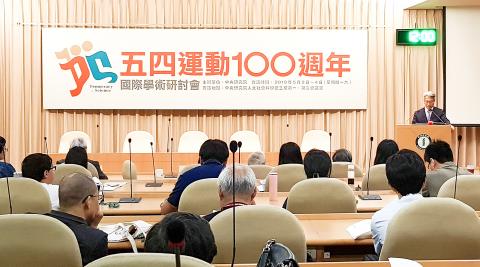Academia Sinica yesterday began a three-day conference in Taipei to mark the centenary of the May Fourth Movement, with Academia Sinica president James Liao (廖俊智) saying that academic research must be independent and free of the yoke of political ideology.
The movement was triggered by a massive student protest in Beijing on May 4, 1919, against the then-Chinese Nationalist Party (KMT) government’s inaction in the face of intrusive foreign powers, which led to young people pursuing democracy and science.
In his opening remarks, Liao highlighted the founding of Academia Sinica as inheriting the movement’s spirit of developing science, liberty, democracy and creativity.

Photo: Chien Hui-ju, Taipei Times
The institution was established in China in 1928 when the then-KMT government was based there. It relocated to Taiwan in 1949 following its defeat in the Chinese Civil War.
Academics should adhere to professionalism and independence even when dealing with highly politicized scientific issues, Liao said.
The movement can be described as a moral revolution, given that it led to enlightenment in different aspects of life, such as changing views about marriage with reduced emphasis on parental wishes, Academia Sinica vice president Huang Chin-shing (黃進興) said.
Academic Chen Yung-fa (陳永發) delivered the keynote speech, titled: “How Mao Zedong (毛澤東) abducted the history of the May Fourth Movement.”
Mao misled followers into believing that liberalism was something to shake off in their ideological struggles, Chen said, adding that Mao’s discourses caused the movement to veer toward Marxism.
The conference, which closes tomorrow, has 16 sessions, with more than 60 research papers to be presented, while two roundtables on the final day are to wrap up reflections on and the legacy of the movement, the institution said.
Across the Taiwan Strait, Chinese President Xi Jinping (習近平) highlighted nationalism and political loyalty in a speech in celebration of the movement in Beijing on Tuesday.
The movement led by progressive young people was a patriotic revolution to defend people’s dignity, spread new ideas and disseminate Marxist ideas, Xinhua news agency cited Xi as saying.
Young Chinese people in the new era should continue to love their country, follow the instructions of Chinese Community Party and work to realize the dream of reviving the great Chinese people, Xi said.

Beijing could eventually see a full amphibious invasion of Taiwan as the only "prudent" way to bring about unification, the US Department of Defense said in a newly released annual report to Congress. The Pentagon's "Annual Report to Congress: Military and Security Developments Involving the People's Republic of China 2025," was in many ways similar to last year’s report but reorganized the analysis of the options China has to take over Taiwan. Generally, according to the report, Chinese leaders view the People's Liberation Army's (PLA) capabilities for a Taiwan campaign as improving, but they remain uncertain about its readiness to successfully seize

Taiwan is getting a day off on Christmas for the first time in 25 years. The change comes after opposition parties passed a law earlier this year to add or restore five public holidays, including Constitution Day, which falls on today, Dec. 25. The day marks the 1947 adoption of the constitution of the Republic of China, as the government in Taipei is formally known. Back then the Chinese Nationalist Party (KMT) governed China from Nanjing. When the KMT, now an opposition party in Taiwan, passed the legislation on holidays, it said that they would help “commemorate the history of national development.” That

Taiwan has overtaken South Korea this year in per capita income for the first time in 23 years, IMF data showed. Per capita income is a nation’s GDP divided by the total population, used to compare average wealth levels across countries. Taiwan also beat Japan this year on per capita income, after surpassing it for the first time last year, US magazine Newsweek reported yesterday. Across Asia, Taiwan ranked fourth for per capita income at US$37,827 this year due to sustained economic growth, the report said. In the top three spots were Singapore, Macau and Hong Kong, it said. South

Snow fell on Yushan (Jade Mountain, 玉山) yesterday morning as a continental cold air mass sent temperatures below freezing on Taiwan’s tallest peak, the Central Weather Administration (CWA) said. Snowflakes were seen on Yushan’s north peak from 6:28am to 6:38am, but they did not fully cover the ground and no accumulation was recorded, the CWA said. As of 7:42am, the lowest temperature recorded across Taiwan was minus-5.5°C at Yushan’s Fengkou observatory and minus-4.7°C at the Yushan observatory, CWA data showed. On Hehuanshan (合歡山) in Nantou County, a low of 1.3°C was recorded at 6:39pm, when ice pellets fell at Songsyue Lodge (松雪樓), a